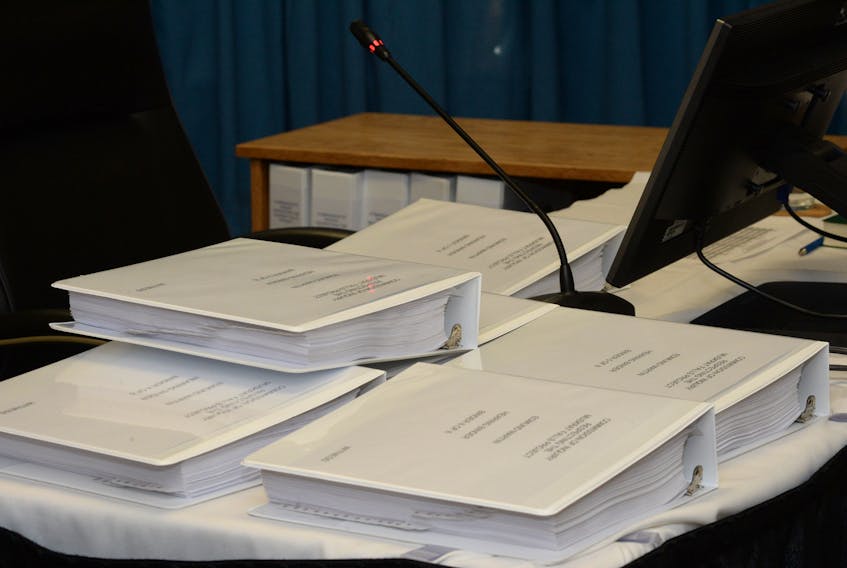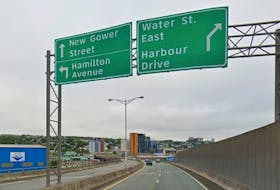Things were tense with former Nalcor Energy president and CEO Ed Martin during his first day on the stand at the Muskrat Falls Inquiry in St. John’s. Martin slowed the pace of questioning at times and clashed with inquiry co-counsel Kate O’Brien.
As O’Brien told Commissioner Richard LeBlanc at the end of the day, she moved more slowly than expected through her questions.
She still managed to cover a fair bit of ground.
Conservation and demand management (CDM)
Martin said he understands conservation and demand management programs (think: TakeCharge NL) could reduce island power demand. However, he would not rely on savings through CDM in deciding on whether or not to pursue Muskrat Falls hydroelectric power.
“I just want to make the point my experts (were) telling me CDM statistically can’t work for us and the impact, whatever (amount) was put in, was minimal,” he said of the island of Newfoundland system, while acknowledging a consultant had recommended more could go to “aggressive” CDM programming.
Martin went back and forth with O’Brien on the subject. He said it could affect cost comparisons, but he did not see it as being reliable to incorporate into electricity planning at this point in this jurisdiction.
“Our job is to keep the lights on,” he said of Nalcor Energy, pointing to risk in CDM reliance.
Quebec imports to get to 2041
Auditors have told the inquiry that Nalcor Energy decided against purchase and import of power from Quebec early on, when weighing new-power options.
Martin testified the province could not rely on Quebec to negotiate a reliable, firm supply at that time. Asked about a deal between Quebec and Vermont, he said that contract was a renewal of an existing arrangement. Vermont also wasn’t isolated, had options and agreed to a provision that allows Quebec to hold back power if it needed that power for itself — something Newfoundland and Labrador wasn’t in a position to do.
Martin generally referenced documents on Quebec’s firm power availability (they’ve since added to their capacity). In Hydro-Québec’s 2009 to 2013 plan, the utility was looking to add capacity. “Taking account of the needs and means anticipated to date, additional capacity will be required during the period covered by the Electricity Supply Plan 2008-2017,” the utility stated.
A plan for 2016 to 2020 spoke to the desire of Hydro-Québec to acquire assets or stakes outside of Quebec, adding to electricity available for sale. The report references the desire to export “at the right time and on the right markets” to maximize revenues. Martin said it was one reason not to go in that direction.
Chief financial officer feeling ‘out of the loop’
Nalcor Energy chief financial officer Derrick Sturge suggested to the inquiry he felt out of the loop at times on developing cost estimates and schedule for the project.
Asked about it, Martin said it’s not unusual for a finance team to be at arm’s length from megaproject estimating.
“It’s not my job to keep him in the loop. If you’re not in the loop, go get in the loop,” he said. “He’s a CFO of the company.”
He said Sturge was an important player, including on the federal loan guarantee for the project. He said Sturge effectively completed tasks put to him.
“But that being said, I’m hiring these people, they’re officers of the company, I’m not babysitting them,” he said, adding he’s confident Sturge also had the wherewithal to obtain information he needed.
A request to finance with CIBC
While he was on the stand, Sturge said he felt uncomfortable when it was suggested to him in 2013 the project’s financing be settled solely with CIBC. He said the suggestion came to him through Martin, but he could not say where it came from beyond that.
“Let me put it this way, I can’t remember exactly where it came from. It was not a pressure situation,” Martin said, adding he didn’t see it as an expectation, or an issue.
He suggested he could not remember exactly where the request came from, although he said with confidence there were no directions on financing from either former premier Kathy Dunderdale or former ministers.
O’Brien said he was vague with his comments.
“The bottom line is (financing) was properly assigned. So, there it is,” Martin said.
The project was financed, after a competitive process demanded by Sturge, through a syndicate of Canadian banks, including TD, BMO, RBC, Bank of Nova Scotia and CIBC. Sturge said it was the single largest, one-time infrastructure financing in Canada — being project financing in one tranche.
•••
Martin is scheduled to be on the stand through to the end of the week.
RELATED STORY:
The Muskrat Falls Inquiry









